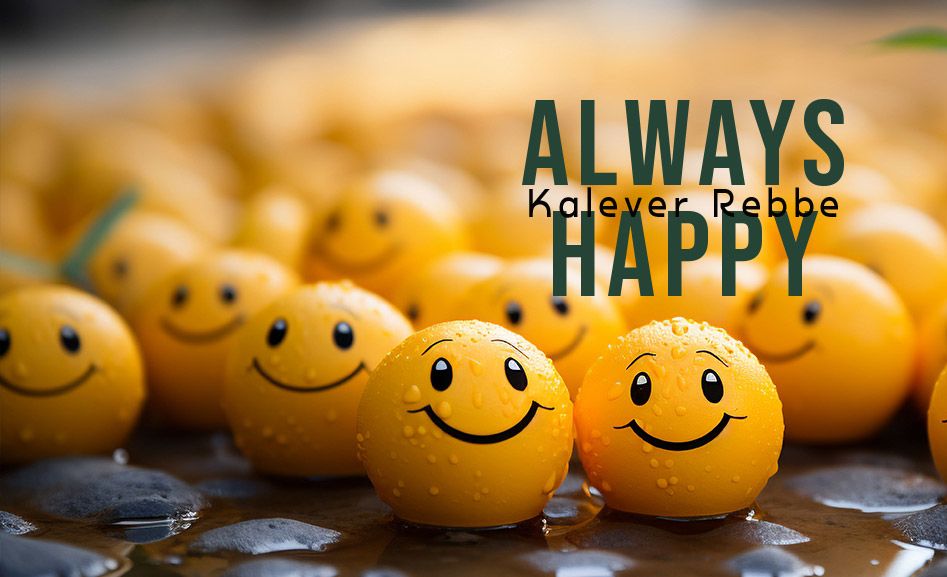
New, Nissan, Nachman
The First of Nissan is not only Rebbe Nachman's birthday, it's the first day of the first month of the Hebrew calendar, a time for rejuvenation and a fresh start...

The wonderful thing about the 1st of Nissan is that not only is it Rebbe Nachman’s birthday, it’s the first day of the first month of the Hebrew calendar, one of the four Jewish New Years described in the Mishna.
It’s no coincidence that Rebbe Nachman was born of the first day of the year, for Rebbe Nachman taught us to always make new beginnings. Intrinsically, that’s what cleaning for Pesach is all about – we’re making a new beginning!
Even if a person transgressed thousands of times, and he thinks that Hashem will never forgive him, he shouldn’t despair! At any given moment, he can declare a new beginning. From this moment on, he can start anew. Rebbe Nachman of Breslev teaches that Hashem derives immeasurable gratification when those who were far away from Him suddenly seek Him and call His name.
A setback is no reason for despair. Indeed, setbacks are the springboards for new and greater efforts as long as a person is constantly making new beginnings. The more we make new beginnings, the less the setbacks in life affect us. What’s far worse than the setback is the evil inclination’s attempt to induce depression and despair following the setback. This way, the evil inclination totally incapacitates a person. The more one has emuna and the more one reinforces himself with new beginnings, the less vulnerable he is to the evil inclination, despair, and depression.
The war against the evil inclination and one’s natural gravitation toward melancholy are a lifelong struggle. We must constantly renew and reinforce our emuna, believe and realize that everything is from Hashem, and avoid the laziness and lethargy that result from failing to pick ourselves up and start anew after a setback.
In spirituality, the concept of “old” has nothing to do with age. A twenty year-old can be an old man while a person of eighty-nine can be young and vibrant. Constant renewal keeps us young. King Solomon calls the evil inclination “the old fool” because it tries to keep a person from renewing himself by neutralizing him with pessimism and despair. Don’t fall into the evil inclination’s trap. By being in constant renewal one remains  perpetually young and constantly growing.
perpetually young and constantly growing.
As soon as a person declares a new beginning, his evil inclination falls into despair. By not letting past mistakes bring us down and by moving forward in new beginnings, the evil inclination loses all influence over us.
Practically, when the evil inclination buzzes like a fly in your ear and starts giving you two dozen reasons to fret about the past, send him for a long walk off a short bridge! Tell him that you’re a new person that has just now been born. What are you talking about past mistakes? I just now arrived! I’m a new person!
The only thing that can destroy a person are thoughts about the past. Why waste valuable emotional energy on something that’s out of our control?
In my many years of counseling people, I’ve encountered individuals so vanquished by depression and despair that nothing seemed to help them. They couldn’t believe that Hashem would ever forgive them for their past mistakes or misdeeds. I had to sign a paper for them, assuming personal responsibility for all their past transgressions on condition that they agree to make a fresh new start in life, forget the past, and begin to serve Hashem in the very best way they can. I was even willing to sign such a paper in the presence of two bonafide witnesses.
You’re probably asking how I have the gall to do such a thing. I’m certainly no tzaddik who has the power to assume another person’s transgressions. But I knew that if a person makes a genuine new start – as Hashem wants him to – his past slate will be wiped clean. A righteous lifestyle at a later age proves that we wouldn’t have transgressed at a younger age had we known better.
Hashem knows that despair and depression neutralize a person. One who is spiritually “down for the ten count” won’t have the will to get out of bed in the morning, much less pray, learn Torah, and perform mitzvot. Hashem is therefore interested that a person declare a new beginning, for this will give him the energy and incentive to start anew.
Each person should therefore declare a new beginning and decide that from this moment on, I’m a new person and will truly try my best to get close to Hashem! It doesn’t matter if we declare a new beginning every single hour; by doing so, the evil inclination has no power over us.
Rebbe Nachman of Breslev teaches that the beginning sets the tone for the continuation. When the beginning is good, so is the continuation. The opposite is true as well; when the beginning is weak, so is the continuation. We see this principle at play all around us. For example, in the construction industry, if the foundation of a building is weak, then the building itself will be weak. If the bottom first row of bricks or cinder blocks is slightly crooked, then the subsequent wall won’t be level.
Once again, if our beginning wasn’t optimal, that’s no problem! We simply declare a new beginning. And don’t think that this new beginning isn’t as good as the old beginning. Every time we declare and make a new beginning, we do so with the advantage of more experience, more awareness of past pitfalls, and higher chances for success just so long as we don’t fret about the past at all. When a person makes constant and multiple new beginnings, sooner or later he’ll excel and succeed.
Once again, the new beginning is exactly what Hashem wants from us. Forget about the past and move forward. King Solomon, the wisest of all men, said (Proverbs 24:16), “A righteous man falls seven times but gets up; the wicked man stumbles on wickedness.” King Solomon is telling us that it doesn’t matter if a righteous person falls; as long as he declares a new beginning and gets back on his feet, he’s still called “righteous.” Yet, the wickedness that a wicked person stumbles on is the lethargy of despair that leads to the emotional and spiritual fatigue that neutralizes a person. That’s why Jeremiah the Prophet juxtaposes daily renewal with emuna: They are new every morning; great is Your faithfulness. (Lamentations 3:23)
Rebbe Nachman testified that his success in serving Hashem was due to the fact that he made constant new beginnings. No matter what the fall or setback was, he’d rebound immediately with a new beginning. This wonderful advice can work for us too, because it’s exactly how Hashem wants us to act.
The Torah talks about the Jewish people receiving Hashem’s commandments by way of Moses and says, “Today you have become the Nation of G-d” (Deuteronomy 27:9). Rashi explains, “Every day in your eyes should be as the first day in which you came into covenant with Hashem.” So we see that we must live each day as if it were our first in the service of Hashem. Therefore, we should tell ourselves constantly, “Today, I’m beginning to be an upright person. Today, I’m starting to cling to Hashem. Today, I hope to pray and learn with earnest…”
The mindset of starting anew is the true meaning of foresight. Foresight means to look forward and never to look back. It’s easy to understand that we can’t function in life if we look back all the time instead of looking forward. Imagine that a driver would be obsessed with his rear-view mirror. He wouldn’t be able to move forward without endangering himself and everyone else on the road. When we focus on the task at hand and keep our gaze forward, we function better. An improved present gives positive prospects for the future and cancels out the darkness of the past. We can only guarantee that improved “here and now” by declaring a new beginning.
There’s only one time a day when probing the past is permissible: that’s during our daily hour of self-assessment and personal prayer. This is the appropriate time to look back at what we did during the past 24 hours, and if need be, ask Hashem’s forgiveness and do teshuva for any misdeeds or outright transgressions we might have done. Once we confess to Hashem, apologize, and resolve to try our best to improve from now on, then we can forget about the past! It no longer matters! Daily self-assessment and personal prayer is therefore the best way to maintain a positive outlook and focus on the present, because we have already accounted for the past in the best possible manner by doing daily teshuva.
Declare your own personal new beginning right now. Smile, and G-d bless in everything you do!










Tell us what you think!
Thank you for your comment!
It will be published after approval by the Editor.